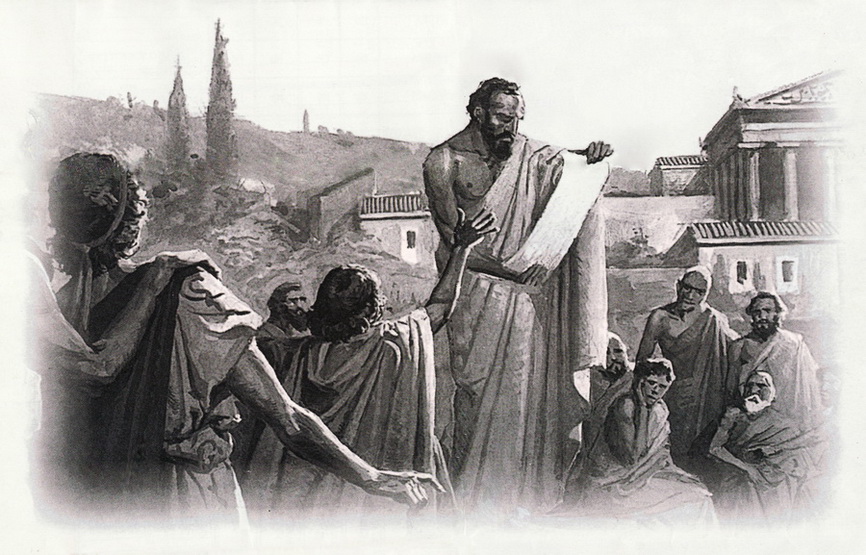| The Seven Wise Man |

| one can say "He believes it, but it isn't so", but not "He knows it, but it isn't so" |
KNOWLEDGE |
| __________________________________________________________________________________________________________________________________________________________________________ |
Knowledge is defined (Oxford English Dictionary) variously as:
Philosophical debates in general start with Plato's formulation of knowledge as "justified true belief". There is however no single agreed definition of knowledge presently, nor any prospect of one, and there remain numerous competing theories. Knowledge acquisition involves complex cognitive processes: perception, learning, communication, association, and reasoning. The term knowledge is also used to mean the confident understanding of a subject, potentially with the ability to use it for a specific purpose. |
|
 |
|
| Defining knowledge |
"We suppose ourselves to possess unqualified scientific knowledge of a thing, as opposed to knowing it in the accidental way in which the sophist knows, when we think that we know the cause on which the fact depends, as the cause of that fact and of no other, and, further, that the fact could not be other than it is. Now that scientific knowing is something of this sort is evident — witness both those who falsely claim it and those who actually possess it, since the former merely imagine themselves to be, while the latter are also actually, in the condition described. Consequently the proper object of unqualified scientific knowledge is something which cannot be other than it is" ( Aristotle, Posterior Analytics (Book 1 Part 2)
|
|
Because any knowledge incorporates concepts and will be expressed using terms, the interdependencies between knowledge and language are essential for the definition itself. This has been demonstrated by Hey recently. Psychologists currently distinguish between declarative knowledge and procedural knowledge, where the first comprises concepts organized into a semantic network such as wordnet and the second are actions that are like verbs and can be organized into a semantic net or used as predicates in first order logic representations.
Communicating knowledge Symbolic representations can be used to store meaning. The mapping from the symbolic representation to meaning can be thought of as a dynamic process. Hence also the transfer of the symbolic representation can be viewed as an ascription process whereby knowledge can be transferred. Situated knowledge Situated knowledge is knowledge specific to a particular situation. Imagine two very similar breeds of mushroom, which grow on either side of a mountain, one nutritious, one poisonous. Relying on knowledge from one side of an ecological boundary, after crossing to the other, may lead to starving rather than eating perfectly healthy food near at hand, or to poisoning oneself by mistake |
 |
Some methods of generating knowledge, such as trial and error, or learning from experience, tend to create highly situational knowledge. One of the main benefits of the scientific method is that the theories it generates are much less situational than knowledge gained by other methods. Situational knowledge is often embedded in language, culture, or traditions.
Partial knowledge One discipline of epistemology focusses on partial knowledge. In most realistic cases, it is not possible to have an exhaustive understanding of an information domain, so then we have to live with the fact that our knowledge is always not complete, that is, partial. Most real problems have to be solved by taking advantage of a partial understanding of the problem context and problem data. That is very different from the typical simple math problems that we solve at school, where all data are given and we have a perfect understanding of formulas necessary to solve them. Knowledge management Knowledge management is a management theory which emerged in the 1990s. It seeks to understand the way in which knowledge is created, used and shared within organizations. A significant part of Knowledge Management theory and practice aligns two models: (i) the DIKW model, which places data, information, knowledge and wisdom into an increasingly useful pyramid. (ii) Nonaka's reformulation of Polanyi's distinction between tacit and explicit knowledge. Both of these models are increasingly under challenge with different schools of thought emerging which are more fully described and referenced in the main article. An objective of mainstream knowledge management is to ensure that the right information is delivered to the right person just in time, in order to take the most appropriate decision. In that sense, knowledge management is not interested to manage knowledge per se, but to relate knowledge and its usage. This leads to Organizational Memory Systems. More recent developments have focused on managing networks (the flow of knowledge rather than knowledge itself) and narrative forms of knowledge exchange. Taboo knowledge Many people feel that there are genres or fields of knowledge which should not be explored, or in other words that should be taboo. Sometimes, knowledge appears to threaten religion, philosophies, and personal beliefs or values, and therefore is suppressed from investigation. Knowledge sometimes appears to offer more harm than value, and therefore is deemed to merit controls or restrictions. Religious meaning of knowledge In Catholicism and Anglicanism, knowledge is one of the Seven gifts of the Holy Spirit Hindu Scriptures say two kinds of knowledge. Paroksha Gnana and Aporoksha Gnana. Paroksha Gnana is knowledge that is second hand , the knowledge that is obtained from books, from heresay etc. Aporoksha Gnana is the knowledge borne of direct experience, i.e. the knowledge that one discovers for himself. |